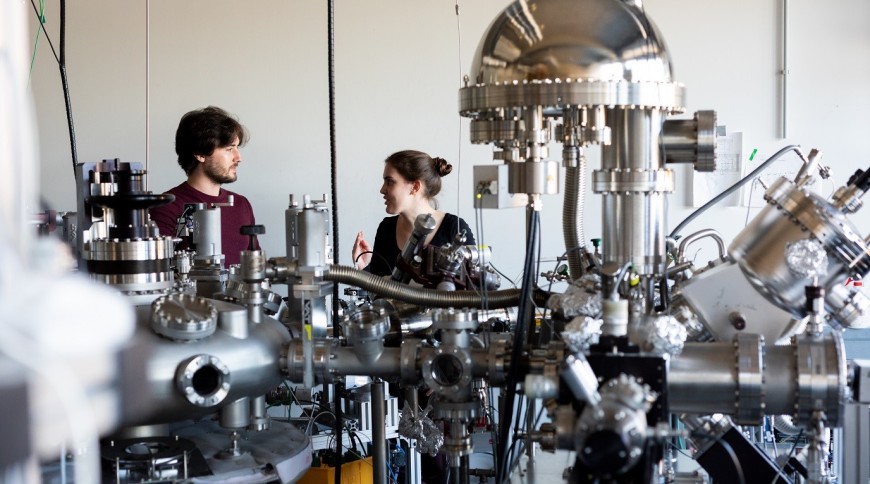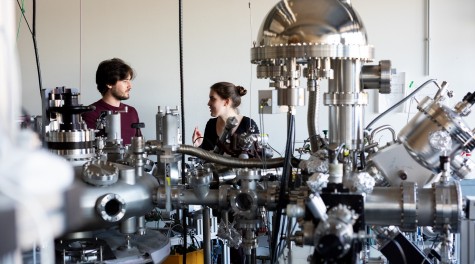Published: 25th May 2021
Michael,
Materials Science B.Sc.
If you are generally interested in natural sciences but don’t exactly know where you want to go, Materials Science is the answer! The degree course gives you countless opportunities to grow and specialise in your field of interest.
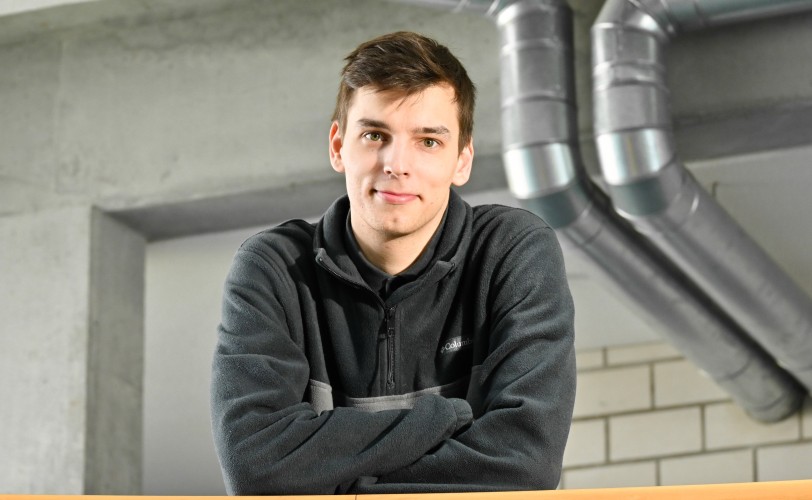
Ready for a “Mat Sci” adventure?
Hi there! Thank you for taking the time for our interview. Let’s get started right away and have a look at what student life is like. Materials Science is quite a particular field of study and not known to many people. So what made you decide to study this degree course and what is it all about?
Janik: “To be honest, I didn’t know very much about it at the start, but I was immediately interested in it because of the focus on natural sciences. After all, Materials Science is based on mathematics, physics and chemistry. So, I registered for the degree course and started studying, and what can I say? I’m close to completing my master’s and am still very happy with my decision! There are so many areas to specialise in and so many directions you can choose from, such as the aerospace sector, the automotive industry or research on implants, for example. Whatever you decide, anything is possible with Materials Science.”
Sophie: “I learned about Materials Science at an information booth at the Hessentag (a regional event in the state of Hesse) a while ago. It sounded just perfect to me, as the degree basically covers everything I wanted to do at that time. And it still continues to fascinate me today. The fact that TU Darmstadt is always high up in the rankings is of course another big advantage.”
Torben: “I also came across the degree course more by chance than actually looking for it. I was at the hobit (an event in Darmstadt for pupils to gather information about career paths) when I saw smoke rising from one of the stands, so I went over to see what was going on. It turned out to be the Materials Science booth and the people there were showing exciting experiments and giving out apple juice and orange juice with dry ice. It was so cool.”
That does sound exciting! So what did you expect from Materials Science before you started your degree?
Torben: “I didn’t have any specific expectations, but that was okay. I was pretty unsure about the path I wanted to take before I started my degree. I only knew that I wanted to do something with natural sciences. Materials Science is the perfect choice because it combines many disciplines from natural science and can be so versatile. Over the course of my degree, my interests emerged more and more and I ended up focusing on failure analysis, but I am also interested in surface science and electrochemistry.”
Michael: “I wasn’t entirely sure what to expect, especially because I didn’t take physics at school. So I was a bit unsure at first. But now physics has become one of my favourite subjects! Even though I didn’t exactly have the perfect prerequisites for the degree course, I still grabbed the opportunity and I am very happy that I did.”
So Materials Science can also be an option for lateral entrants? To whom would you generally recommend the degree programme?
Michael: “Definitely! I would recommend the degree programme to anyone who’s interested in many areas of natural science. Having great marks or even having taken all subjects at school is not a necessity at all. Materials Science simply combines them.”
Sophie: “Materials Science is right for you if you are interested in the explanation for scientific connections or phenomena. Of course, a certain degree of self-discipline is also needed, but the most important thing is to be passionate about science.”
The advantages of “Mat Sci” up close
What benefits does Materials Science have compared to classic disciplines such as chemistry or physics?
Janik: “Classic degree courses like Chemistry very much push you in one specific direction. In Materials Science, you can concentrate on a specific area, but you can also get an insight into so many other disciplines or even specialise in several fields at the same time. The many very different subjects and working in the numerous different research labs can make the degree seem difficult at times, but if you enjoy it, it is absolutely worth it. And with a degree in Materials Science, you have numerous options available after you have finished your studies.”
Torben: “Exactly, and by the way: if the degree programme is too time-consuming, you also have the option of studying part-time. And if you have to work at the same time – like I do– there are several different models which make this possible, too. Another benefit compared to the classic degree programmes is that you also have a good chance of being hired as a student assistant at the TU Darmstadt. The many areas covered by materials science allow us to easily find assistant jobs in the other departments, such as Mechanical Engineering, for example.”
Is there something you were particularly fascinated with in your Materials Science degree at TU Darmstadt or were there any pleasant surprises?
Janik: “I didn’t know how small our degree course is compared to others. That was a pleasant surprise and remains one of the biggest benefits of Materials Science. The atmosphere in our department is very familiar. You can just go and ask any professor or fellow student for help and be sure you’ll receive it. There are also no barriers between students in higher and lower semesters. Everybody sits together at the Learning Centre anyway.”
Sophie: “I completely agree; I love the family atmosphere in our department. No matter which working group you are in, everybody works together, hand-in-hand. And it’s just nice to have such great support in achieving your goals.”
Torben: “I wasn’t aware that sustainability plays such a large role in Materials Science and I think that’s great! In the lectures and seminars, for example, we learn about the discovery of alternative materials, the research of future propulsion systems or we try to make processes more sustainable.”
Michael: “Exactly, it’s so exciting! I am currently working on a project to remove lead from functional materials. From a toxicological standpoint, lead is not good for us, especially in third world countries where our old electronic devices often end up. Finding alternatives for materials containing lead, or finding materials that are more sustainable in general – so basically ones that cause the least amount of harm while offering the highest degree of functionality – is therefore an important task. And I’m happy I can make a contribution to this with my degree!”
Firmly on your side: TU Darmstadt
Let’s now get to the question of all questions: Do you already have an idea of what you want to do after your degree? And what opportunities does your degree course open up for you here?
Michael: “I’m still studying for my bachelor’s degree, so I’ve got some time to figure it out, but I’m definitely interested in international research. The professors here in our department are really well connected to other universities around the world. So a career abroad is definitely an option!”
Torben: “I also first want to stay in research and I’m considering writing a doctoral thesis on renewable energies. I currently work at the Fraunhofer Institute and can certainly imagine staying there. This is a job I got through my student assistant position by the way, and just goes to show how well connected everything is here.”
Sophie: “To be honest, I have also thought about doing a PhD! I definitely want to do something with medicine. As part of a comprehensive research internship, the Advanced Research Lab, we covered the topic of 3D printing organs. On this basis, I decided to write my master’s thesis on the subject of cell characterisation. Apart from doing a PhD, I could also imagine working at a university hospital or in a research department at Merck.”
Janik: “I’m currently specialising in automotive technology and want to work in the automotive industry. But doing more research is also an option. In my opinion, this just shows the large range of options you have with a degree in Materials Science when it comes to industrial sectors and jobs.”
That all sounds so exciting – it’s hard to believe that you are all studying the same thing! TU Darmstadt probably also supports you in your professional goals and career opportunities as well, is that right?
Sophie: “Of course! As Michael already hinted at, the professors in our department have excellent networks, both in Germany and around the world. This opens up opportunities for going abroad. The professors are very happy to help promote our careers. I had help getting a position for my master’s thesis which unfortunately had to be cancelled due to the pandemic. But in general, you can certainly benefit from personal connections here.”
Janik: “The faculty also has excellent links to industry sectors. I originally asked whether I could write my bachelor’s thesis at the company where I completed my internship. In the end, I ended up at Bosch on their recommendation.”
Torben: “Some projects also result in further networking. There is currently an interdisciplinary and international project called “INSPIRED 2021” in cooperation with Unite! Universities, in which those involved are researching the construction of a greenhouse on Mars. The opportunities we have are just incredible. However, you can’t make something from nothing! In general, you have to put in some effort in order to benefit from these links.”
So there really are no obstacles to a bright future! Thank you so much for the exciting interview! Who wants to say some final words to those interested in Materials Science?
Michael: “If you are generally interested in natural sciences but don’t exactly know where you want to go, Materials Science is the answer! The degree course gives you countless opportunities to grow and specialise in your interests.”
Janik: “And if you discover a passion for any specific subject area during your bachelor’s degree, completing a Materials Science degree also provides the basis for other master’s degrees, such as Energy Science and Engineering. So it is definitely worth taking a closer look at this degree programme! There are even special opportunities to do so, such as “Mat Sci for a day”. Those interested in the degree can register there and visit a lecture with us, or simply check out what life is like in Materials Science. And if you have any questions, you can also contact the student council. We are always open to your questions and are delighted to see your interest in the degree course.”
Overview of Materials Science – orientation guide for prospective students
Do you want to find out more about Materials Science? Why not take a look online at the orientation offers? Whether you want to visit the Materials Science labs for a day, take part in an internship at the Institute, or have materials scientists come to your school to talk about the degree programme, we have compiled the different possibilities to learn about the degree course here. All the important information is also listed there, so you can find everything in one place and read it in peace.
Are you ready to study Materials Science? Test yourself!
The OSA online tool will help you make an informed choice about your degree. You can answer questions on your expectations for the degree course, your approach to learning, as well as specialised tasks on focus topics and existing knowledge on the Materials Science degree programme. Participation remains entirely anonymous and has no impact on a potential application and admission procedure at TU Darmstadt. The results are solely for your own information and self-assessment. Why not give it a try?

Michael
Hi, I’m Michael and I’m doing my bachelor’s in Materials Science at TU Darmstadt. Compared to other degree courses, Materials Science is still a relatively young field and therefore not particularly well known in Germany. The degree course is a modern, highly interdisciplinary programme focused on natural sciences that aims to prepare students for current requirements in materials research and development. I particularly liked the varied subjects during the bachelor’s degree, as I had chemistry, physics, mathematics and computer science lectures along with those geared towards materials science.
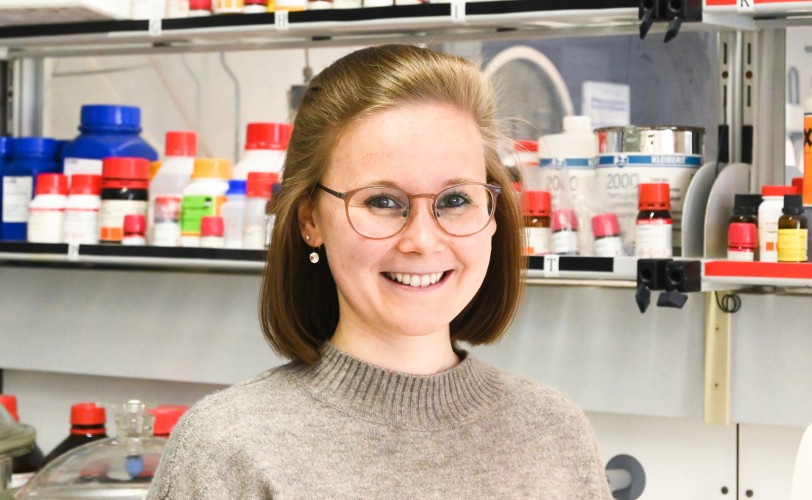
Sophie
Hi, I’m Sophie and I’m doing my master’s in the Materials Science programme. The large diversity of the programme has fascinated me time and again and awoken new interests. I’ve now reached the end of my studies and have decided to write my thesis on cell characterization and modification, something I never would have expected when I first started studying here. I would personally recommend the degree programme to anyone who is interested in all natural sciences and is open to a wide range of subject matters.
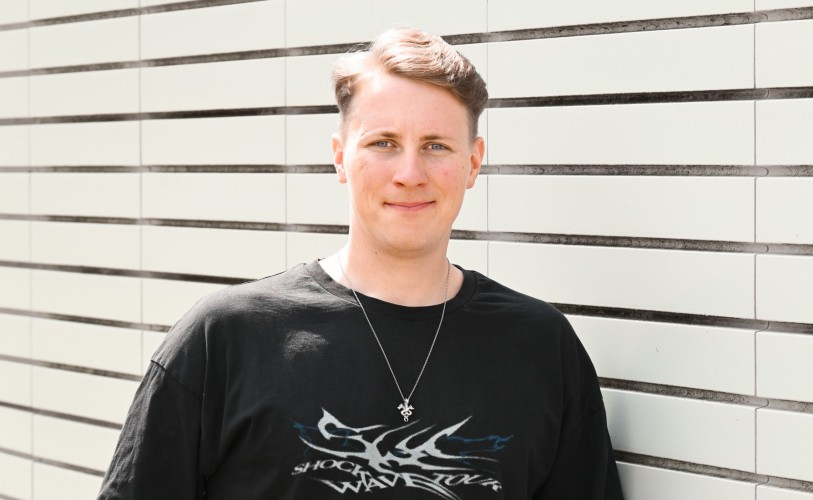
Sean Janik
Hi, I’m Janik and I’m doing my master’s in Materials Science. I’m very glad I choose this degree course as it has proven to be extremely diverse and has also brought me many new contacts, whether in the form of friendships or direct links to the industry. In addition to studying, I have also been an active participant on the student council since the first semester of my bachelor’s degree with the intention of being able to help students with any problems in their degree. I expect to complete my degree in spring next year, and looking back, I’m very grateful for the great times and the familiar atmosphere within the comparatively small department.
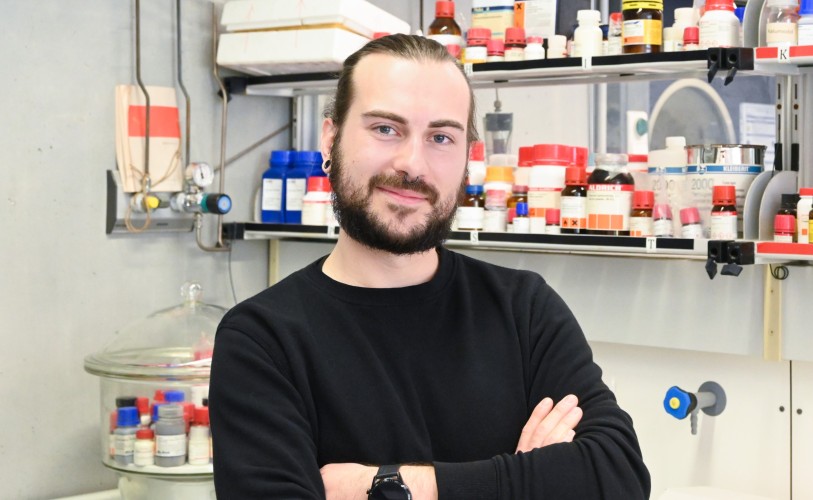
Torben
Hi, I’m Torben and I’m doing my master’s in Materials Science which I’m completing part-time. Alongside my degree, I also work at a Fraunhofer Institute where I can immediately apply what I’ve learned. This helps me to better understand complex issues and expand my knowledge. I have also been working in the interest and for the well-being of our students on the student council since my first bachelor semester. In my spare time, I have projects such as working on old mopeds, 3D printing or voluntary participation in organising a non-profit festival, in which I greatly benefit from the skills I’ve learned in my degree.


